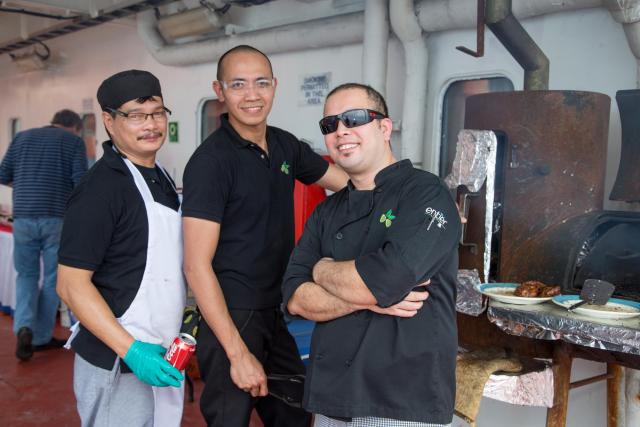Who is the most important person on the ship? The ‘Camp Boss’ Tim Proctor with his team ensure we are well looked after.
In a ship the size of JOIDES Resolution there are teams of people working night
and day to keep the whole expedition running smoothly.
We have the captain in charge with officers and navigators supporting this role.
The engineers keep the ships engines, electrics, fresh water systems and air
conditioning working. The camp boss and his hardworking team prepare delicious
food and keep the sleeping quarters (called the hotel stack) clean. Another
team run and maintain the drilling equipment and a further team of laboratory
technicians keep the lab equipment well maintained and ready for use. Finally,
the scientists plan the drilling strategy, analyze the cores and interpret the
results. For the expedition to be successful all of these teams are essential.
In the same way the human body cannot be without any one of its organs, the
expedition cannot survive without any of these teams. For the next few blogs
whilst we are in transit to our first drill site, I will be writing about the
people on this boat who work together to make the expedition a success.
The Camp Boss : Tim Proctor

Tim’s role on this ship is to provision the voyage, run the kitchen and coordinate the domestic maintenance of the boat. His team of 15 works 24 hours a day to provide 4 main meals, to clean the cabins and to do the laundry for the ship.
Tim is from Fife in Scotland. He started working in hotels in 1981, and has since worked in the hotel service on ships and oil rigs before gaining his position on JOIDES Resolution. He enjoys his work on JOIDES Resolution as it combines the catering that he loves with the opportunity to see the world and work within a close team.
Before departure Tim has to ensure that the boat is fully provisioned for the voyage. Typically for a 2 month voyage he orders 1200 kg of flour from which the on board baker makes fresh bread. 4200 kg of meats and another 1000 kg of fish are eaten in dinners and lunches. For breakfasts 10,800 eggs are scrambled and 220 packets of cereal are consumed washed down by 1400 L of milk which is also consumed in coffee and tea. 7500kg of fresh fruit and vegetables are also brought on board, filling the walk-in fridges to absolute capacity. At the start of the two months, fresh salads and green leafy vegetables are plentiful and are frequently on the menu. As time goes on, the diet changes to the hardier more long lasting cabbages, carrots and pumpkins. The shopping bill for this is eye-watering and stowing the food away is time-consuming. Unlike a kitchen in a hotel, much of the food is stored some distance form where it is cooked. The enormous quantities of food required are stored in strange shaped
rooms at the end of long and winding corridors in all the available nooks and
crannies of the ship.

By providing weekly BBQs outside on the deck, and cakes to celebrate birthdays Tim
helps keep morale on the ship high. He and his team also carefully considers food allergies, preferences and religious dietary requirements to meet the
needs of those aboard. Thought is also given to the balance of food groups offered on different shifts. I was interested to learn high carbohydrate meals are avoided at midnight as this can have a soporific effect on night shift staff.
Coming next: Which scientists get their hands on the core first?